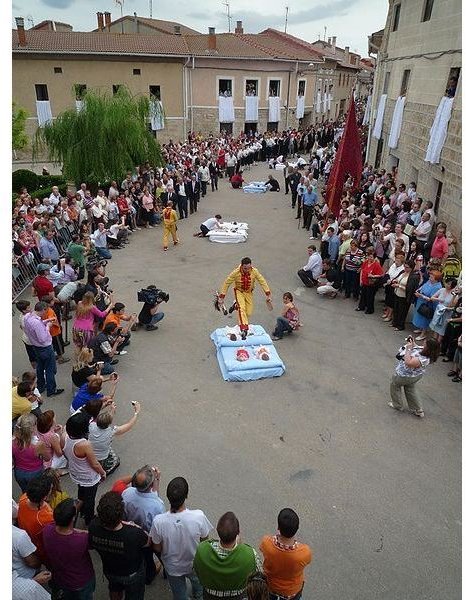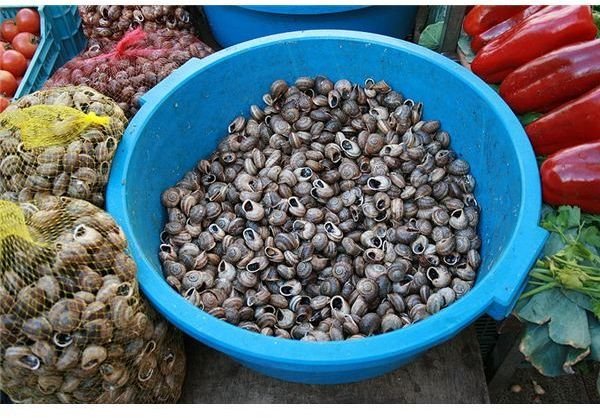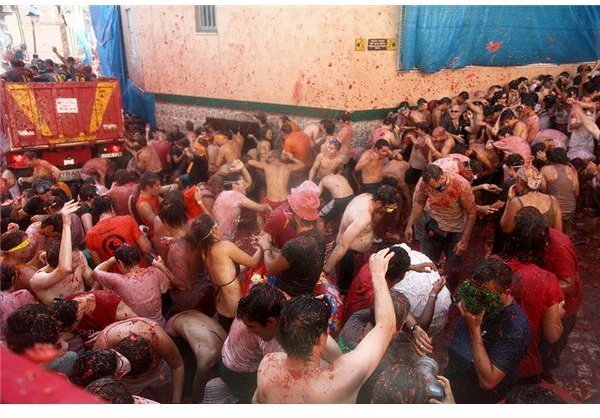Spanish Festivals: Tomatoes, Babies and Snails
Something for Everyone
The Spanish culture is one of gracious hospitality. Perhaps this has contributed to the plethora of celebrations that occur year round. Among the common traditions that surround religious holy days such as Easter and Christmas are the unusual, bizarre and amazing observances of La Tomatina, El Colacho and Aplec del Caragol.
La Tomatina in Buñol
La Tomatina, or the tomato fight, is part of an annual gathering in Buñol, a small village of about 9,000 inhabitants in the Valencia Region on the Mediterranean coast. The rowdy and bizarre tradition takes place on the last Wednesday of August. During the observance, which has become one of the main attractions of Spain’s ample festivities calendar, the number of visitors grows by the thousands.
The event itself takes place in the town square at midday and lasts for less than an hour. It consists of thousands of people assembled in the square. They, literally, throw ripe tomatoes at each other once someone climbs a greased pole, releasing a ham hock hung at the top of the pole. The tomatoes arrive to the battle scene by large trucks.
The origins of this weird fight are not clear, but one legend states that in 1945, a procession of enormous figures with giant heads, the Gigantes y Cabezudos, was passing through Buñol. Some enterprising youngsters, who had nothing to do with the procession tried to join in and one of them accidentally knocked a Giant over, who retaliated by lashing out and swinging at him. In self-defense, the youngster grabbed some tomatoes from a nearby stand and threw them at the giant…and the tradition of the tomato fight was born! Another version claims some friends got into a fight and started throwing tomatoes at each other.
Strict rules from the Buñol Town Council apply to today’s tomato fighters: people cannot bring any bottles or other hard objects, which can cause bodily harm. Only crushed tomatoes are thrown. People must be careful to avoid the lorries, which bring the “ammunition.” T-shirts, hats and cameras make a person an instant target. Those who have attended the fight also recommend bringing and wearing goggles. Tomato juice stings when it gets in the eyes.
At the end of the fight, revelers head to the nearby river to wash tomato drippings from their hair and clothing. Miraculously, there has never been an accident or mishap during this festival.
El Colacho

The Baby Jumping Festival or El Colacho occurs during the Catholic feast of Corpus Christi in late May and early June. Baby jumping is the highlight of the village of Castillio de Murcia, near the medieval city of Burgos.
Every family with a newborn baby brings their baby, well swaddled, placing the child on soft mattresses in the middle of a main street closed to t>raffic. Adult men, dressed as the devil, jump over the groups of infants.
Observance of this strange tradition, which is a cleansing ritual to drive the devil away and to protect the small children from evil and illness for the rest of their lives, dates back to the 1620’s. El Colacho brings the devoted, as well as the curious, to Burgos.
Believers, who did not participate in El Colacho in their youth, might want to participate in the observance of Hogueras, in which they jump through fire. Hogueras is a tradition to ward off illness.
Aplec del Caragol

Aplec del Caragol is a culinary carnival, held from 20th to 22nd of May in Lleida, Cataluña in honor of the snail, which is very popular delicacy in Spain. During the celebration, participants consume about 12 tons of snails. The snails, shipped into Lleida from all over Spain and North Africa, satisfy demand.
The adventurous eater may choose between a great variety of snails and snail dishes, including tradition French escargot as well as local snails in mouthwatering Lleida sauces. Lleida is very proud of its snail tradition as is evidenced by several associations and clubs that exist. They have their own names, costumes, parades and entertainment, performing during the three-day observance.
Aplec del Caragol is part communal meal, part fiesta and a great deal about having a wonderful time enjoying good food, music and culture.
A Country of Festivals
Spain is a country steeped in traditions that are as old as the history of the country itself. Every month there are celebrations of one type or another. Many Spanish festivals are religious in origin; others are part of commerce. Each gives a traveler, memories to last a lifetime.
References:
- Photo credit - La Tomatina -by flydime; Baby Jumping - by Celestebombin; and Spanish Snails by Frank Vincentz, all under Creative Commons License, Wikimedia Commons
- Spain Travel Guide: La Tomatina-Spain’s Biggest Food Fight, Jessica, 2008 - https://www.spaintravelguide.com/la-tomatina-spains-biggest-food-fight.html
- Don Quijote: La Tomatina in Buñol, 2011 - https://www.donquijote.org/culture/spain/fiestas/tomatina.asp
- Spanish Fiestas: The Baby Jumping Festival - https://www.spanish-fiestas.com/spanish-festivals/baby-jumping.htm
- Aplec del Caragol: Welcome - https://www.aplec.org/english.asp
Resources:
Spain Info: Culture in Spain: Festivals, 2003 - https://www.spain-info.com/Culture/festivals.htm
